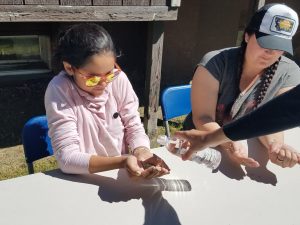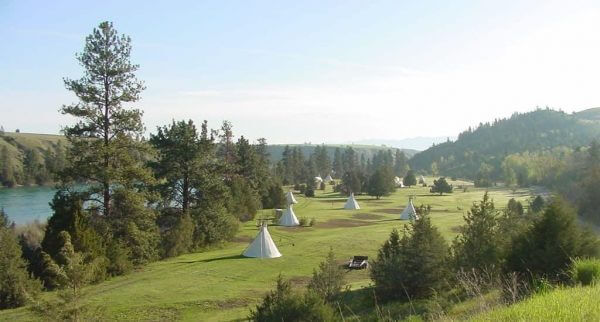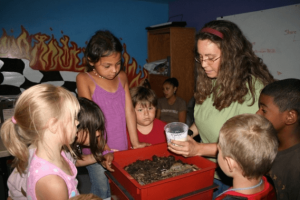Located in Northwestern Montana, the Flathead Indian Reservation is the home of the Confederated Salish and Kootenai Tribes, and is comprised of the Bitterroot Salish, the Pend d’Oreille and the Kootenai tribes. The reservation consists of 1.3 million acres across parts of four counties.
Activities
From its office in Polson, Flathead Reservation Extension offers programs under a broad umbrella that includes agriculture, family and consumer science, youth programming, and nutrition. Projects are community driven and developed in response to community requests. The goals are to:
- Enhance Tribal member involvement in agriculture with an awareness of environmental stewardship and natural resources.
- Enhance and increase economic opportunities for agricultural producers to improve their quality of life and sustain their ranches and farms.
- Improve the nutrition and health of community members while protecting local food supplies by connecting consumers with local and traditional food sources.
- Help youth develop good decision making and leadership skills, and provide opportunities to improve their technical skills.
Highlights
MEASURING IMPACT
-
“…we started out with six little three foot by eight foot raised beds….then expanding…. being able to have something where our goal is working with locally grown foods, working with foods that are indigenous to North America, our food sovereignty [and] teaching people… making it so it’s a life skill with our kiddos and their families.” “…[the agent] was a huge part of helping [us make] connections to our culture and connections to our plate. …This could not have happened without Tribal extension.”
FRTEP programs have had a major impact on individuals, families and tribal communities. Just how much impact has now been quantified thanks to a research project that used Ripple Effects Mapping (REM) and content analysis. The Indian Land Tenure Foundation (ILTF) engaged in a joint collaboration with an evaluation team and the Western Extension Risk Management Education Center to measure the long-term impacts of the Federally Recognized Tribal Extension Program (FRTEP) serving the Flathead Reservation. Click the link below to read the report.
Youth education
Flathead Reservation Extension provides youth education in nutrition, food safety, horticulture, agriculture, natural resources, riparian education, and business. It offers after-school 4-H across the Reservation. 4-H provides research-based educational programming in practical, hands-on ways including natural resource demonstrations, financial education and training, and nutritional education.
Supporting farmers and ranchers
Extension offers education and technical assistance to producers, land managers, and consumers, and offers opportunities to critically evaluate environmental stewardship and resource management techniques with
current and traditional agriculture and food systems.
Cattle producer education
Extension hosts an annual meeting for the more than 160 cattle producers on the reservation. The meeting includes vendors and specialist speakers. Topics are of importance to producers and incorporate their requests for subjects to cover. Recent topics included economic sustainability, animal health and animal identification systems.
Natural Resource Immersion Activities
Extension educators work with local schools to assist with workshops, field trips, and other educational activities. For example, the agent might spend an afternoon in the classroom with 1st grade students followed by a hike in the wilderness the next day where students learn to identify flowers, grasses, shrubs and trees.
Pesticide applicator training
One of the natural resource goals of the Confederated Salish and Kootenai Tribes is to control noxious weeds on Indian lands. Nearly half a million acres of tribally owned and managed land on the reservation is infested with noxious weeds. To address the growing need for pesticide
education and integrated noxious weed management, tribal extension has held pesticide education training that covers safe handling and use of pesticides, integrated pest management strategies, and water quality. Attendees become certified and and receive licenses for pest management which enables them to engage in a variety of integrated pest management strategies.
River Honoring
Each spring Flathead Extension hosts the River Honoring where 4th and 5th grade students from the Reservation and beyond gather to learn about the history and personal connection of the people with the Flathead River. Youth also learn about a variety of environmental, health, and cultural topics during the two-day event. Students learn about the water cycle, stream and bank zone vegetation function, fish and wildlife habitat, and livestock and crop production in riparian areas. Using a riparian/erosion trailer as a teaching tool, students compare a well-vegetated stream bank to a stream bank lacking in vegetation, and they witness erosion in progress. Students eagerly accept the challenge to create a healthy meandering stream with vegetation along the banks.
COVID-19 Activities
- Six-class garden series supporting Food Sovereignty and Food Security endeavors
- Start-up of two 4-H Youth Apiary and Value-Added Entrepreneurship.
- Grow-It-Till-U-Make-It garden and food preservation campaign (photo below)

- 4-H Science-On-the-Go bags to help sustain academic learning during the pandemic
- Material for masks purchased and given to 4-H sewing clubs
- Summer MSU Student intern implemented Ag classes for 5th grade and the Teen Center at the Boys & Girls Club
- Development and implementation of a community survey on mental health and the general population’s understanding and definition of mental health, a critical activity as individuals are coping with the impact of COVID-19.
- Continued/additional certifications in Mental Health First Aid
- Research and policy writing supporting diversity in Montana 4-H Positive Youth Development Programming with focus on ethnic equality and the LGBTQ community.
- 4-H National Mentoring Program activities include mailings of weekly fun, encouraging, and educational packages or postcards to mentees through the end of the school year.
- Teaching in the Boys & Girls Clubs to maintain contact with mentees who also participate in Club programming.
- SNAP-Ed – Supplemental Nutrition Assistance Program Education activities included adult outreach on cooking and nutrition lessons, physical exercise demonstrations, and education about farmers markets.
- Youth outreach to Boys & Girls Club participants in grades 3-6 with the “Choose Health, Food, Fun and Fitness” (CHEF) curriculum.

Contact Information
Brenda Richey – Extension Educator
Phone Number
406-675-2700
flatheadreservation@montana.edu
